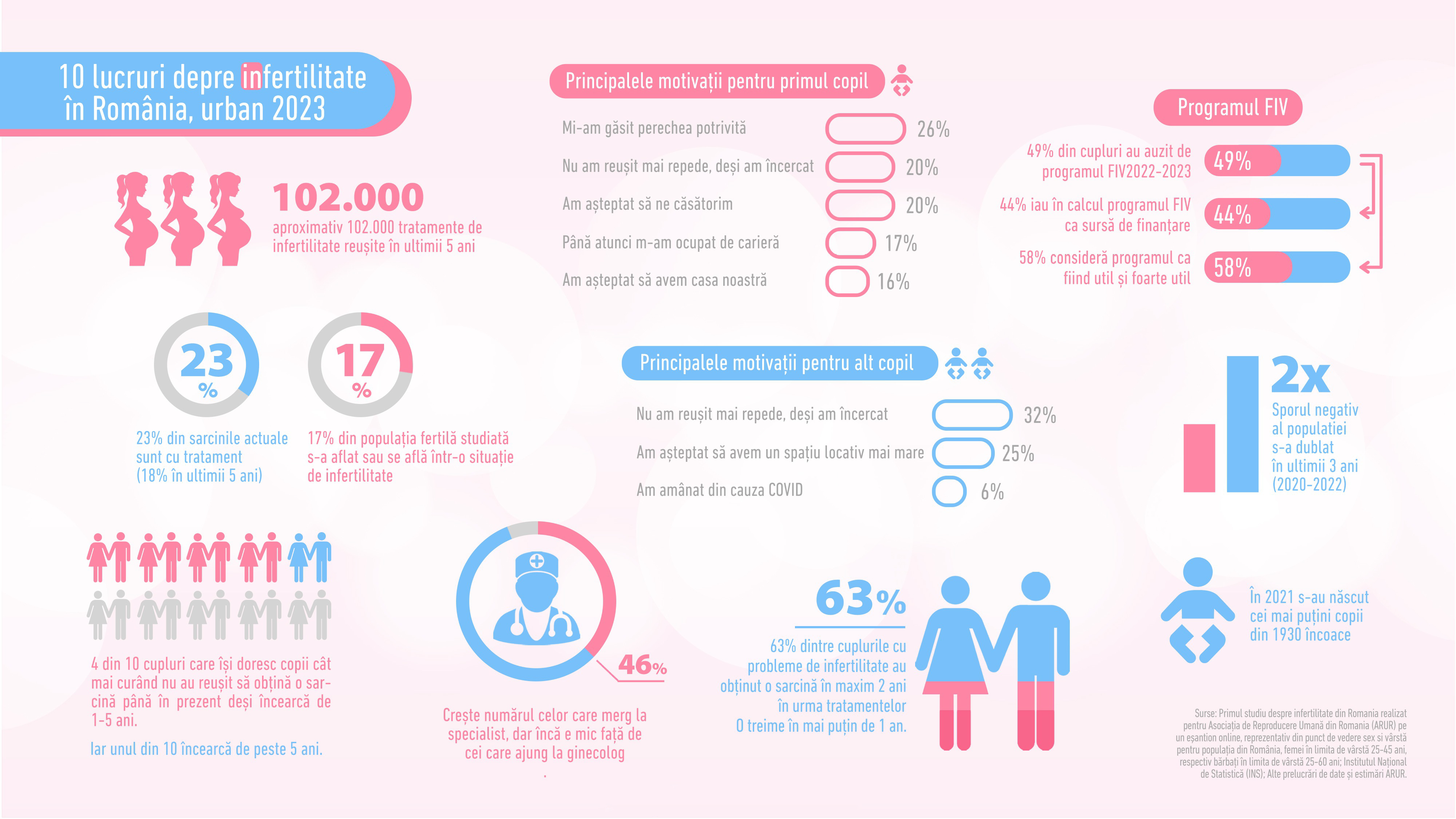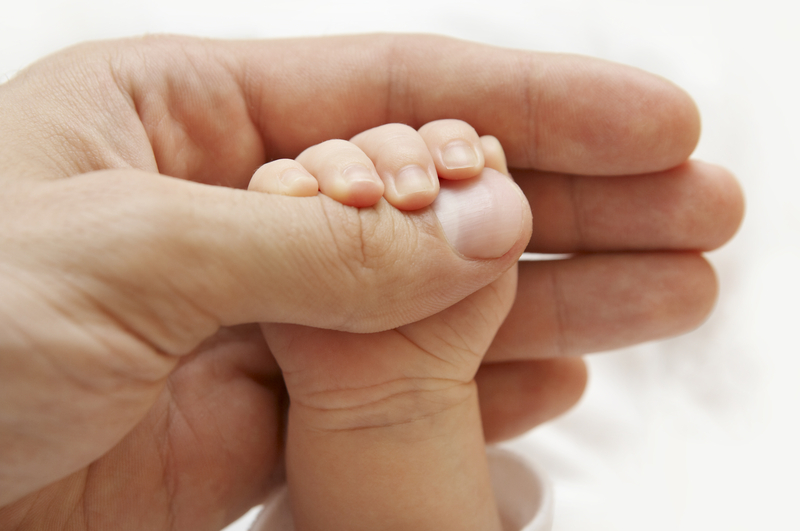
In 2021, the lowest number of births since 1930 to date was recorded in Romania. 17.1% of the fertile population of our country were once or are in a situation of infertility, and 4 out of 10 couples who want a child cannot conceive, although they have been trying for 1-5 years (every 10 couples). tried for more than 5 years). Almost a quarter (23% of current pregnancies) are achieved through specialist treatment, compared to an average of 18% over the past 5 years. These are the results of an infertility study conducted at the initiative of the Romanian Association of Human Reproduction. In addition, only one in five couples (21%) would like to have a child as soon as possible, which is less than in 2018 (29.1%).
After two years of the pandemic and after more than a year of war in a neighboring country, an infertility study initiated by the Romanian Association of Human Reproduction continues the approach started in 2018, offering a dynamic perspective in understanding couples who have or have had fertility problems.
10 things about infertility in the urban environment in Romania in 2023 (conclusions of a study carried out at the initiative of the Romanian Association of Human Reproduction):
- 1. 23% of current pregnancies are achieved through specialist treatment, compared to an average of 18% over the past 5 years.
- 2. 17% of the studied fertile population were or are in a situation of infertility.
- 3. 4 out of 10 couples who want children as soon as possible have still not been able to conceive, although they have been trying for 1-5 years. One in 10 couples have been trying for more than 5 years.
- 4. The number of those who consult an infertility specialist (46%) is increasing, but still small compared to those who consult a gynecologist.
- 5. 63% of couples with infertility problems became pregnant within 2 years of treatment. A third of couples became pregnant in less than a year.
- 6. Approximately 102,000 successful infertility treatments over the past 5 years.
- 7. The main motives for the first child: I found the right couple (26%), I did not succeed faster, although I tried (20%), I was waiting for marriage (20%), until then I took care of my career (17%) , we were waiting for our house (16%).
- 8. The main reasons for giving birth to another child: I didn’t have time sooner, although I tried (32%), I waited until we had more living space (25%), I postponed it because of COVID-19 (6%).
- 9. IVF program: 49% of couples have heard about the IVF program 2022-2023, 44% consider the IVF program a source of funding, and 58% consider the program useful or very useful.
- 10. In 2021, Romania had the fewest births since 1930 (196,858 live births), and the negative population growth has doubled over the past 3 years (2020-2022).

Romanians have few children, and many couples face infertility
According to the National Institute of Statistics, 2021 had the fewest births since 1930 to date. Only 196,858 live births – the final figure for 2021.
After two years of the pandemic and after more than a year of war in a neighboring country, an infertility study initiated by the Romanian Association of Human Reproduction continues the approach started in 2018, offering a dynamic perspective in understanding couples who have or have had fertility problems. The current study was conducted between January and February 2023 on an online sample representative in terms of gender and age of the urban population of Romania, women aged 25-45, respectively men aged 25-60. The sample consisted of 4,495 respondents (statistical error +/- 1.5%). The target population (fertile demographic) consists of women and men in relationships and was 3,005 respondents (statistical error +/- 1.8%).
The main themes covered both areas of infertility treatment (active pregnancy or children born with treatment) and areas of potential infertility (couples who want children are trying but not succeeding naturally). In addition, the study looked at details of specialist medical consultation, infertility diagnoses or assessment of the chances of becoming pregnant after consultation/diagnosis. In addition, the knowledge and relevance of the National Fertilization Program, details about IVF or the process of cryopreservation of oocytes by women were investigated.
In Romania, at the moment, 17.1% of the studied fertile population was or is in a situation of infertility.
Every fifth couple (21%) would like to have a child as soon as possible, this percentage decreased compared to 2018 (29.1%). But more than half of them (52.6% – about 150,000 couples) have so far been unable to conceive despite trying for more than a year, which is a significant increase compared to the 2018 study, when only 38% had this situation.
23% of existing pregnancies are achieved with specialized treatments, representing approximately 8,400 active pregnancies with treatment (January-February 2023), compared to an average of 18% over the past 5 years.
For women, problems with the fallopian tubes, reduced ovarian reserve, endometriosis, or problems with the uterus are the main causes of infertility, while for men, sperm problems are the most common, followed by genetics and hormonal problems.
46% of those unable to conceive had seen an infertility specialist, up from the study 5 years ago when only 38% saw a specialist.
“This research becomes natural and necessary after 5 years from the first data. More and more couples trust Romanian clinics, which is very important. From the data of the study, we can also note that more and more people started to turn to infertility doctors more than 5 years ago, in the previous study,” says Professor Dr. Radu Vladeranu, President of the Romanian Human Human. Reproduction Association.

Baby / Photo: Volodymyr Prusakov – Dreamstime.com
Effective treatments for couples who cannot have children naturally
The reasons why couples decide to have their first child now are different than when they decide to have another child. 26% of couples are waiting to find a suitable match to have their first child, while 25% of couples are waiting for a bigger house/apartment to have another child. At the same time, infertility problems are greater in couples who want another child than in those who have a first child. And the pandemic, and financial problems, or geosituation
the policy is responsible for delaying the decision to have a first/second child for 15.6% of couples who want it.
“Giving birth to a child is not a feat, it should not be only for those who have financial opportunities. There are now effective treatments, it is important that those couples who cannot have children naturally continue, not stop, as research has shown that there are good results with assisted human reproduction procedures,” says Dr. Andreas. Vytulkas, executive director of the Romanian Association of Human Reproduction.
Current data from a study initiated by the Romanian Association of Human Reproduction shows that in vitro fertilization treatment has increased by 80% compared to the previous study (18% for current figures, compared to 10% for figures 5 years ago), which gives us reason to assume that today infertility problems are more complex.
Of those planning to seek a medical infertility procedure in the next year, 44% want IVF and are considering a national insemination program, up from 20% who were considering such a program 5 years ago.
Gabriela Firea, Minister of Family, Youth and Equal Opportunities, explained during a press conference where the study was presented that the ministry has received 11,000 requests since December 5, the start of the IVF program, and continues to receive more. “From the analyzed files, 3,000 files are suitable, we already have 1,000 signed contracts. I did not declare incomplete files unusable, but I asked for a supplement. Soon we will also launch a platform to facilitate the whole process, and we are constantly open to improvements, because we have a real desire to do everything well”, stated Ms. Gabriela Firea, who also clarified that there will be discussions in the middle. year to adjust the budget so that this project has continuity. “It is imperative that this Program continues, especially given the demographics we are facing. Infertility remains a real problem, and I don’t see anyone wanting to close this program,” assured the Minister of Family, Youth and Equal Opportunities.[continuemaialesavândînvederedateledemographicecucareneconfruntămInfertilitatearămâneoproblemarealășieunuvădcacinevasăîșidoreascăsăînchidăacestprogram”adatasigurăriministrulFamilieiTineretuluișEgalitățiideȘanse[continuemaialesavândînvederedateledemograficecucareneconfruntămInfertilitatearămâneoproblemarealășieunuvădcacinevasăîșidoreascăsăînchidăacestprogram”adatasigurăriministrulFamilieiTineretuluișiEgalitățiideȘanse
Source: Hot News
Ashley Bailey is a talented author and journalist known for her writing on trending topics. Currently working at 247 news reel, she brings readers fresh perspectives on current issues. With her well-researched and thought-provoking articles, she captures the zeitgeist and stays ahead of the latest trends. Ashley’s writing is a must-read for anyone interested in staying up-to-date with the latest developments.